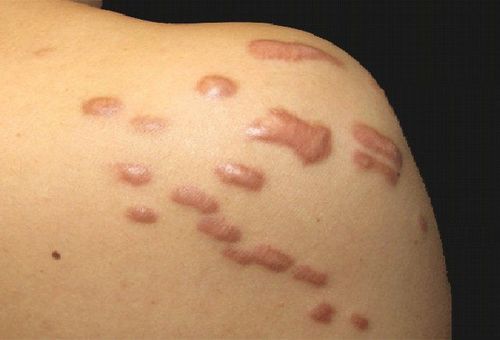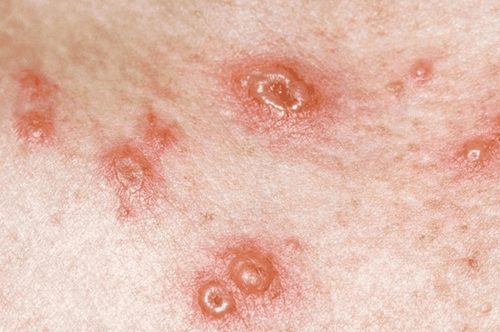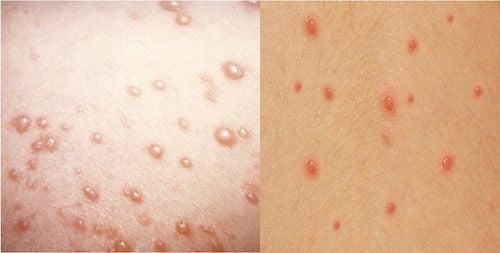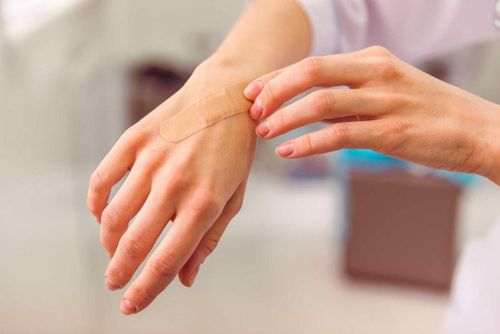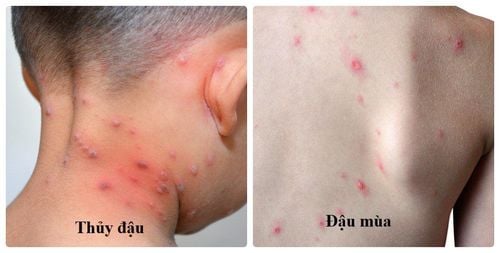The article is professionally consulted by Master, Doctor Nguyễn Thị Nhật - Infectious Disease Specialist - Department of General Medicine & Internal Medicine - Vinmec Hai Phong International General Hospital.
Chickenpox is a contagious disease caused by the Varicella zoster virus. The most characteristic sign of chickenpox is the appearance of water blisters and chickenpox spots all over the body. Typically, these spots dry up and heal naturally without leaving scars. However, if not properly cared for, chickenpox scars can significantly affect the aesthetics of the face.
1. Understanding chickenpox
Chickenpox is a respiratory-transmitted illness caused by the Varicella zoster virus. The chickenpox virus can affect both children and adults with symptoms such as fever, vomiting, headache, and the appearance of water blisters. After 1-2 days, chickenpox spots will appear on the face and all over the body. The disease usually lasts 3-4 weeks, and after recovery, the chickenpox spots will dry up and heal without leaving scars.
However, in some cases, if not carefully and properly cared for, chickenpox spots with bacterial superinfection can leave scars and dark spots on the skin, significantly affecting the aesthetics of the face, especially for women.
"How long do chickenpox scars last?" depends on the individual's skin type and care methods. To prevent scars, chickenpox patients should avoid rubbing the chickenpox spots, limit sun exposure, drink plenty of water, and supplement with vitamins. Do not pick or squeeze the blisters.
Trắc nghiệm: Bạn có phân biệt được chính xác cảm lạnh và cúm mùa?
Cảm cúm và cảm lạnh là hai khái niệm mà chúng ta thường đánh đồng nó giống nhau, không phân biệt rõ ràng. Dưới đây là một số câu hỏi trắc nghiệm, giúp bạn có thêm những kiến thức phân biệt cảm lạnh và cảm cúm. Từ đó, có những biện pháp điều trị bệnh phù hợp.2. Sẹo thủy đậu có hết không?
2. Do chickenpox scars go away?
With prompt and proper treatment, chickenpox generally does not result in scarring. The dark spots from chickenpox usually disappear after 3-6 months, depending on the individual's skin type. The darkening of the skin is due to post-inflammatory hyperpigmentation and bacterial infection in the chickenpox spots. Therefore, chickenpox patients should avoid direct sunlight by using sunscreen, sun-protective clothing, wide-brimmed hats, and maintaining personal hygiene to prevent chickenpox scars.
In children under 15 years old, the skin regeneration process is very good, so chickenpox scars are rare. Even if the blisters break, the dark spots can easily disappear after a few months without treatment. For children over 15 years old and adults, the skin regeneration process takes longer, and if the blisters are not properly protected, they are prone to superinfection and scar formation. At this stage, do not apply scar treatment methods when the skin lesions have not fully healed. Only treat chickenpox scars when the lesions have formed new skin.
Untreated chickenpox scars may persist for an extended period, impacting facial aesthetics and leading to embarrassment and reduced self-confidence.
3. How to treat chickenpox scars
To improve the condition of scars and dark spots caused by chickenpox, you can refer to the following methods:
- To speed up the fading of dark spots and heal skin damage, supplement with foods rich in vitamin K for healthy skin. Drink plenty of water to increase circulation and boost natural collagen production.
- Consider using natural scar remedies such as honey, pearl powder, gotu kola, lemon juice, oatmeal, or aloe vera.

- Select scar treatment products with verified sources and prioritize those containing natural ingredients like Bromelain, Aloe vera, and Allium cepa.
- If after 1 year of treatment, the dark spots and chickenpox scars do not improve, consider high-tech scar treatment methods such as breaking down fibrous tissue, surgery, or injecting substances into the scar base to help flatten the scar. However, if you need treatment, you should go to reputable facilities and consult with a doctor for the best results.
To arrange an appointment, please call HOTLINE or make your reservation directly HERE. You may also download the MyVinmec app to schedule appointments faster and manage your reservations more conveniently.





